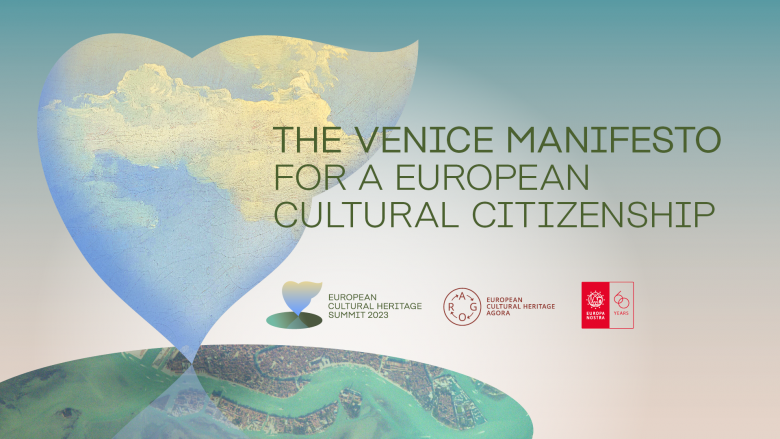The Venice Manifesto For a European Cultural Citizenship

Read/download the Manifesto in English – French – Italian
WE, the actors and supporters of the culture and cultural heritage worlds, many of whom gathered in the World Heritage City of Venice from 27 to 30 September 2023, on the occasion of the European Cultural Heritage Summit;
Celebrating, on the occasion of the 60th anniversary of Europa Nostra, the invaluable role of culture and cultural heritage, both tangible and intangible, built, natural and digital, for the future of our continent and for its meaningful relations with the rest of the world;
Recalling Europa Nostra’s previous campaigns, including the Berlin Call to Action (2018), the Paris Declaration (2019), the Europe Day Manifesto (2020) with the European Heritage Alliance, the Prague Manifesto (2022); and joint calls with our partners, including the Cultural Deal for Europe (2020, renewed 2023) and the Global Call to put Heritage, Arts and Creative Sectors at the heart of climate policy (2023);
Drawing inspiration from many conventions and declarations adopted in the last 70 years, both at European* and international** level, which have defined and promoted the multiple values of culture and cultural heritage for shaping more peaceful and sustainable, fair and inclusive societies;
Deeply concerned about the tragic effects of the return of war in Europe and its close neighbourhood, especially in the Near East, and appalled by the losses of so many lives and livelihoods, as well as by the deliberate attacks against cultural and heritage sites;
Equally preoccupied by the increasing threats to Europe’s fundamental values, in particular those of peace and solidarity, democracy and human rights, the rule of law, freedom of speech and artistic expression;
Persuaded that culture and cultural heritage provides key forces that connects Europe and its citizens and residents, and that this sense of togetherness is all the more crucial at today’s times of fear and uncertainty;
Convinced that culture and heritage have the potential to build bridges and foster dialogue between people regardless of their nationality, gender, ethnic origin, religion or belief, disability, age, sexual orientation, gender identity or expression, economic status and other diverse backgrounds;
Committed to combating the increasing negative effects of climate change, through a joint effort linking sustainability, innovation and inclusivity in many relevant areas ranging from cultural tourism to responsible agriculture, and mobilising forces of culture and heritage to propose new ideas, energy and perspectives for the continent;
Solemnly launch a Manifesto which seeks to promote a wide discussion on a concept of “European Cultural Citizenship”, with an emphasis on its political rather than legal meaning.
Ever since the start of the ongoing process of European integration, not enough emphasis was given to the fact that Europe’s diverse countries, cities and communities, could be assembled around their shared culture and cultural heritage. By proposing to embrace and further develop the concept of a European Cultural Citizenship, we wish to highlight the artistic, spiritual and philosophical dimension of Europe’s shared heritage as well as the fundamental values of human rights and the spirit of freedom and peace which are rooted in this heritage.
The experience of the past 70 years has clearly demonstrated that the European Project cannot evolve without the support of its people, and even less so against their will. Over time, this lack of due recognition of the vital humanist and cultural dimension of this process has become its main shortcoming. This is why it is high time to put culture and heritage where it belongs: at the very heart of the European Project. The innovative, cohesive and positive concept of European Cultural Citizenship is open to all who live in Europe and who are convinced of the key role of culture in transcending any physical or mental divides. This is a prerequisite for building a more peaceful and democratic future based on just, inclusive and sustainable societies living in better harmony with our natural environment and resources.
Each community, city and region in Europe bears traces of its rich artistic and intellectual past. Reflected in every corner by its stunning heritage, Venice displays very visible signs of this immense cultural richness and cross-cultural fertilisation. Indeed, across the millennia, Europe has produced generations of builders, artists, musicians, philosophers and scientists, who have travelled, connected and worked together over and above many tangible and intangible barriers. Progressively, they have shaped and shared a corpus of values that have been and still are a reference point for many nations and peoples across the world.
Based on this rich and diverse cultural legacy, the proposed concept of a European Cultural Citizenship will contribute to strengthening our sense of belonging and togetherness through a shared awareness and sense of pride of what represents the true heart and soul of a Europe united in its diversity: its culture and cultural heritage. This concept does not aim to replace or jeopardize national, regional or local expressions of our identities. Rather, it aims to enrich and reinforce them by recognising and embracing a fundamental European dimension with which they are complementary, evidencing firmly and clearly the multi-layered identities that all citizens and residents in Europe enjoy. At the same time, we must also leverage our shared heritage and values to build creative and mutually beneficial partnerships with other cultures, communities, cities, countries and continents across the globe.
* Including the Cáceres Declaration of the Ministers of Culture of the European Union (Cáceres, 2023); the Convention on the Value of Cultural Heritage for Society (Faro, 2005); and the European Cultural Convention (Paris, 1954)
** Including the Convention Concerning the Protection of the World Cultural and Natural Heritage (Paris, 1972); and the Convention for the Safeguarding of the Intangible Cultural Heritage (Paris, 2003)






